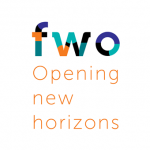2 FWO research PhD fellowships granted
Two prestigious FWO strategic basic research PhD fellowships (2020-2024) are awarded at VUB Architectural Engineering.
Aurélie Van Wylick will work on self-healing concrete with fungi under the supervision of Lars De Laet in collaboration with Eveline Peeters (MICR) and Hubert Rahier (FYSC).
Concrete is one of the most widely used construction materials. However, concrete structures suffer from severe durability issues such as material degradation and reinforcement corrosion due to the ingress of water caused by crack formation, an inherent flaw of concrete. High maintenance and repair costs are therefore unavoidable and pose a burden to the economy. Cement manufacturing and the construction sector account for respectively 8% and 40% of the global CO2 emissions, causing a high impact on the environment as well.
In this research, a novel concept of using fungi is introduced, leading to more durable concrete structures where crack formation is no longer a threat for the steel reinforcement thanks to an increased resilience of the material. Very recent research shows that fungi are eligible candidates for this application; these microorganisms promote the precipitation of calcium carbonate onto fungal hyphae to fill and heal the cracks in concrete.
This PhD research aims for the self-healing of cracks larger than 1 mm and targets infrastructure suffering from water and chloride exposure such as tunnels, dams, bridges and marine structures. Making these structures watertight is key to prevent reinforcement corrosion, to reduce repair costs and to extend their lifespan.
Margaux Lespagnard will start research in circular design and develop design guidelines for accessible qualitative housing market under the supervision of Niels De Temmerman and Waldo Galle.
As real-estate prices in Belgium, as in most Western countries, are rising, more and more households struggle to find access to qualitative housing. This results in pressure on conventional housing aid systems. New alternatives are emerging to answer these challenges. One trend tries to minimize land costs through new residential typologies like cohousing. Another trend includes inventive financing models like cooperative ownership.
Most of these trends focus on the initial cost. Circularity as a design and construction strategy has the potential to reduce costs over the full lifespan. Through choices that ease maintenance and building alterations by enabling reuse and recycling, circularity makes any typology and financial model more affordable in the long run. Its implementation is slowed down by a lack of understanding of the relationship between specific design choices and the typology and financial model in which they are applied.
This research will create concrete insight into how circular design choices enhance the affordability of owner-occupied housing, in relation to the emerging residential typologies and financial models. These insights will be translated into exemplary case studies and design tools, like decision matrices and workshop formats that allow building developers and architects to make better-informed choices. They will allow architects to make the right choice at the right moment to make housing more accessible in the long run.
Congratulations Aurélie and Margaux!

